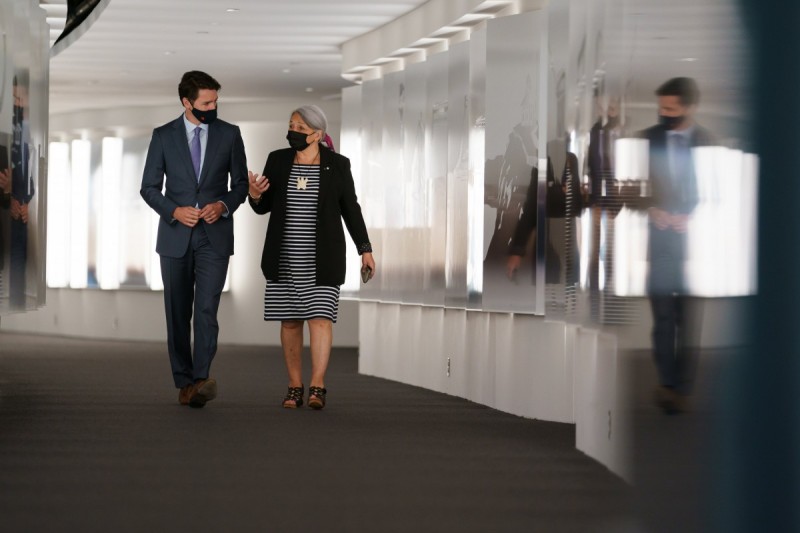Is Canada’s governor general just a rubber stamp for the PM?

Prime Minister Justin Trudeau and newly appointed Governor General Mary Simon. Photo from Twitter.
Only 26 percent of Canadians would be happy with an election this fall, according to a recent Nanos poll. But at the end of the first week of August, Prime Minister Justin Trudeau may visit Governor General Mary Simon, asking her to dissolve parliament and hold a summer election.
That the governor general will very likely grant the prime minister’s wish is one more sign that Canadian democracy needs a rethink.
Governors general and their provincial counterparts can turn down requests for an election. In 2017, the lieutenant governor of British Columbia refused Premier Christie Clark’s request to dissolve the legislature. And there are more examples from Canada and other countries that follow the Westminster model.
But the weight of expert opinion is that, after perhaps a year or so, constitutional convention (as developed in Canada, anyway) requires the governor general to dissolve parliament if that’s what the prime minister wants. And that’s a problem.
In our political system, parliament is supposed to be supreme. MPs are supposed to act as a check on government. Their role is to hold ministers to account in parliament. They have the power to defeat a government on a simple majority vote on a confidence bill or motion. And the governor general is supposed to be the protector of that constitutional order, including parliament’s rights.
But when the governor general is called on, the result is that the prime minister is supreme—not parliament.
In 2007, the governor general agreed to Stephen Harper’s request to prorogue parliament, for no apparent reason other than preventing an impending non-confidence vote. In 2008, the governor general agreed to Harper’s request to dissolve parliament—despite, only months before, parliament having passed a fixed election date law to “stop leaders from trying to manipulate the calendar simply for partisan political advantage,” as Harper once argued.
In 2020, a different governor general agreed to prorogue, helping Trudeau escape the WE scandal. And now, in 2021, yet another governor general will likely dissolve parliament only because Justin Trudeau wants to try to shake free of the current minority parliament.
In at least some parliaments, it seems reasons matter. The UK Supreme Court in 2019 found Prime Minister Boris Johnson’s request to prorogue was “unlawful” because it prevented parliament from carrying out its constitutional functions “without reasonable justification.”
Here, it’s hard to see the reasonable justification for Trudeau’s wish for dissolution. Parliament continues to function. The government has parliamentary confidence. Its bills are not being defeated. And in NDP leader Jagmeet Singh the government has a willing partner if Trudeau wants to make this minority parliament work.
Singh’s NDP helped pass the government’s 2050 net-zero legislation, though improvements were insisted on. And the NDP offered to help fast-track a conversion therapy law, though that offer was rejected by Trudeau. The NDP pushed the Liberals for stronger pandemic response measures, then supported them. If the Liberals want to make this minority work, they have a partner.
But it’s not just that agreeing to an election would again come without reasonable justification. It would also come in direct opposition to the will of the theoretically supreme parliament, which passed a fixed date election law and recently voted nearly unanimously to oppose dissolution.
Liberals, Conservatives and their lobbyist friends may prefer to work in the impenetrable darkness of majority power, but minority parliaments have a history of working well for Canadians. And they would be more frequent if we had a fair, proportional voting system. It’s in the interest of Canadians that our head of state keeps minority parliaments working, not shut them down.
In a more democratic Canada, if Justin Trudeau wanted dissolution, our governor general would tell him to either give reasons proving the need for an election or get back to work.
Of course, that might be more likely to happen if the search committee to find a governor general was struck by parliament, whose rights the governor general is supposed to protect, rather than the prime minister—who those rights need to be protected from.
But this is Canada, and it seems an election will be upon us, regardless of what Canadians or their supreme parliament want. The good news is there are reasons to be optimistic about a better next parliament.
Tom Parkin is a frequent political columnist and commentator with a bluntly social democratic point of view. Follow him on Twitter @TomPark1n.

